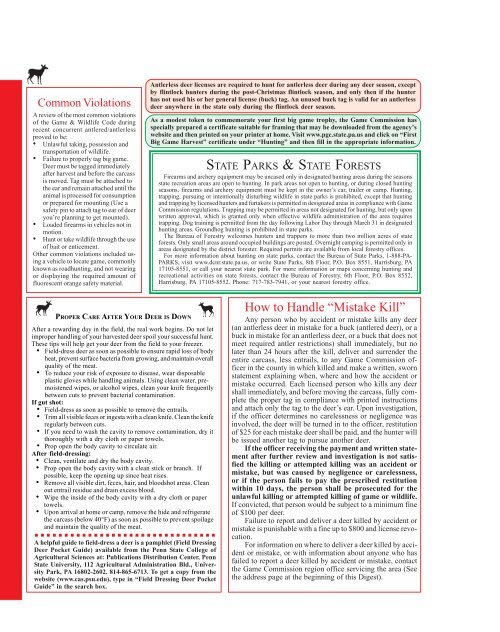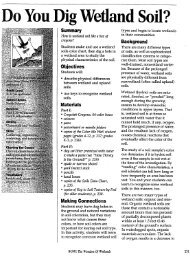Digest of Hunting and Trapping Regulation - Pennsylvania Envirothon
Digest of Hunting and Trapping Regulation - Pennsylvania Envirothon
Digest of Hunting and Trapping Regulation - Pennsylvania Envirothon
You also want an ePaper? Increase the reach of your titles
YUMPU automatically turns print PDFs into web optimized ePapers that Google loves.
Common Violations<br />
A review <strong>of</strong> the most common violations<br />
<strong>of</strong> the Game & Wildlife Code during<br />
recent concurrent antlered/antlerless<br />
proved to be:<br />
• Unlawful taking, possession <strong>and</strong><br />
transportation <strong>of</strong> wildlife.<br />
• Failure to properly tag big game.<br />
Deer must be tagged immediately<br />
after harvest <strong>and</strong> before the carcass<br />
is moved. Tag must be attached to<br />
the ear <strong>and</strong> remain attached until the<br />
animal is processed for consumption<br />
or prepared for mounting (Use a<br />
safety pin to attach tag to ear <strong>of</strong> deer<br />
you’re planning to get mounted).<br />
• Loaded firearms in vehicles not in<br />
motion.<br />
• Hunt or take wildlife through the use<br />
<strong>of</strong> bait or enticement.<br />
Other common violations included using<br />
a vehicle to locate game, commonly<br />
known as roadhunting, <strong>and</strong> not wearing<br />
or displaying the required amount <strong>of</strong><br />
fluorescent orange safety material.<br />
PROPER CARE AFTER YOUR DEER IS DOWN<br />
After a rewarding day in the field, the real work begins. Do not let<br />
improper h<strong>and</strong>ling <strong>of</strong> your harvested deer spoil your successful hunt.<br />
These tips will help get your deer from the field to your freezer.<br />
• Field-dress deer as soon as possible to ensure rapid loss <strong>of</strong> body<br />
heat, prevent surface bacteria from growing, <strong>and</strong> maintain overall<br />
quality <strong>of</strong> the meat.<br />
• To reduce your risk <strong>of</strong> exposure to disease, wear disposable<br />
plastic gloves while h<strong>and</strong>ling animals. Using clean water, premoistened<br />
wipes, or alcohol wipes, clean your knife frequently<br />
between cuts to prevent bacterial contamination.<br />
If gut shot:<br />
• Field-dress as soon as possible to remove the entrails.<br />
• Trim all visible feces or ingesta with a clean knife. Clean the knife<br />
regularly between cuts.<br />
• If you need to wash the cavity to remove contamination, dry it<br />
thoroughly with a dry cloth or paper towels.<br />
• Prop open the body cavity to circulate air.<br />
After field-dressing:<br />
• Clean, ventilate <strong>and</strong> dry the body cavity.<br />
• Prop open the body cavity with a clean stick or branch. If<br />
possible, keep the opening up since heat rises.<br />
• Remove all visible dirt, feces, hair, <strong>and</strong> bloodshot areas. Clean<br />
out entrail residue <strong>and</strong> drain excess blood.<br />
• Wipe the inside <strong>of</strong> the body cavity with a dry cloth or paper<br />
towels.<br />
• Upon arrival at home or camp, remove the hide <strong>and</strong> refrigerate<br />
the carcass (below 40°F) as soon as possible to prevent spoilage<br />
<strong>and</strong> maintain the quality <strong>of</strong> the meat.<br />
A helpful guide to field-dress a deer is a pamphlet (Field Dressing<br />
Deer Pocket Guide) available from the Penn State College <strong>of</strong><br />
Agricultural Sciences at: Publications Distribution Center, Penn<br />
State University, 112 Agricultural Administration Bld., University<br />
Park, PA 16802-2602. 814-865-6713. To get a copy from the<br />
website (www.cas.psu.edu), type in “Field Dressing Deer Pocket<br />
Guide” in the search box.<br />
Antlerless deer licenses are required to hunt for antlerless deer during any deer season, except<br />
by flintlock hunters during the post-Christmas flintlock season, <strong>and</strong> only then if the hunter<br />
has not used his or her general license (buck) tag. An unused buck tag is valid for an antlerless<br />
deer anywhere in the state only during the flintlock deer season.<br />
As a modest token to commemorate your first big game trophy, the Game Commission has<br />
specially prepared a certificate suitable for framing that may be downloaded from the agency’s<br />
website <strong>and</strong> then printed on your printer at home. Visit www.pgc.state.pa.us <strong>and</strong> click on “First<br />
Big Game Harvest” certificate under “<strong>Hunting</strong>” <strong>and</strong> then fill in the appropriate information.<br />
STATE PARKS & STATE FORESTS<br />
Firearms <strong>and</strong> archery equipment may be uncased only in designated hunting areas during the seasons<br />
state recreation areas are open to hunting. In park areas not open to hunting, or during closed hunting<br />
seasons, firearms <strong>and</strong> archery equipment must be kept in the owner’s car, trailer or camp. <strong>Hunting</strong>,<br />
trapping, pursuing or intentionally disturbing wildlife in state parks is prohibited, except that hunting<br />
<strong>and</strong> trapping by licensed hunters <strong>and</strong> furtakers is permitted in designated areas in compliance with Game<br />
Commission regulations. <strong>Trapping</strong> may be permitted in areas not designated for hunting, but only upon<br />
written approval, which is granted only when effective wildlife administration <strong>of</strong> the area requires<br />
trapping. Dog training is permitted from the day following Labor Day through March 31 in designated<br />
hunting areas. Groundhog hunting is prohibited in state parks.<br />
The Bureau <strong>of</strong> Forestry welcomes hunters <strong>and</strong> trappers to more than two million acres <strong>of</strong> state<br />
forests. Only small areas around occupied buildings are posted. Overnight camping is permitted only in<br />
areas designated by the district forester. Required permits are available from local forestry <strong>of</strong>fices.<br />
For more information about hunting on state parks, contact the Bureau <strong>of</strong> State Parks, 1-888-PA-<br />
PARKS, visit www.dcnr.state.pa.us, or write State Parks, 8th Floor, P.O. Box 8551, Harrisburg, PA<br />
17105-8551, or call your nearest state park. For more information or maps concerning hunting <strong>and</strong><br />
recreational activities on state forests, contact the Bureau <strong>of</strong> Forestry, 6th Floor, P.O. Box 8552,<br />
Harrisburg, PA 17105-8552. Phone: 717-783-7941, or your nearest forestry <strong>of</strong>fice.<br />
How to H<strong>and</strong>le “Mistake Kill”<br />
Any person who by accident or mistake kills any deer<br />
(an antlerless deer in mistake for a buck (antlered deer), or a<br />
buck in mistake for an antlerless deer, or a buck that does not<br />
meet required antler restrictions) shall immediately, but no<br />
later than 24 hours after the kill, deliver <strong>and</strong> surrender the<br />
entire carcass, less entrails, to any Game Commission <strong>of</strong>ficer<br />
in the county in which killed <strong>and</strong> make a written, sworn<br />
statement explaining when, where <strong>and</strong> how the accident or<br />
mistake occurred. Each licensed person who kills any deer<br />
shall immediately, <strong>and</strong> before moving the carcass, fully complete<br />
the proper tag in compliance with printed instructions<br />
<strong>and</strong> attach only the tag to the deer’s ear. Upon investigation,<br />
if the <strong>of</strong>ficer determines no carelessness or negligence was<br />
involved, the deer will be turned in to the <strong>of</strong>ficer, restitution<br />
<strong>of</strong> $25 for each mistake deer shall be paid, <strong>and</strong> the hunter will<br />
be issued another tag to pursue another deer.<br />
If the <strong>of</strong>ficer receiving the payment <strong>and</strong> written statement<br />
after further review <strong>and</strong> investigation is not satisfied<br />
the killing or attempted killing was an accident or<br />
mistake, but was caused by negligence or carelessness,<br />
or if the person fails to pay the prescribed restitution<br />
within 10 days, the person shall be prosecuted for the<br />
unlawful killing or attempted killing <strong>of</strong> game or wildlife.<br />
If convicted, that person would be subject to a minimum fine<br />
<strong>of</strong> $100 per deer.<br />
Failure to report <strong>and</strong> deliver a deer killed by accident or<br />
mistake is punishable with a fine up to $800 <strong>and</strong> license revocation.<br />
For information on where to deliver a deer killed by accident<br />
or mistake, or with information about anyone who has<br />
failed to report a deer killed by accident or mistake, contact<br />
the Game Commission region <strong>of</strong>fice servicing the area (See<br />
the address page at the beginning <strong>of</strong> this <strong>Digest</strong>).



